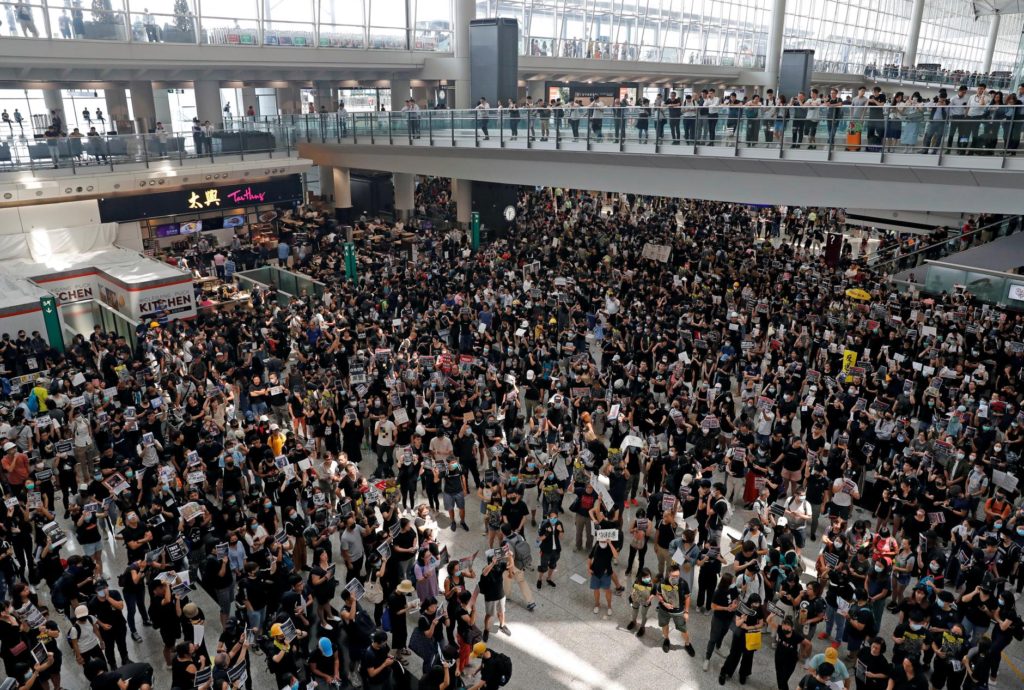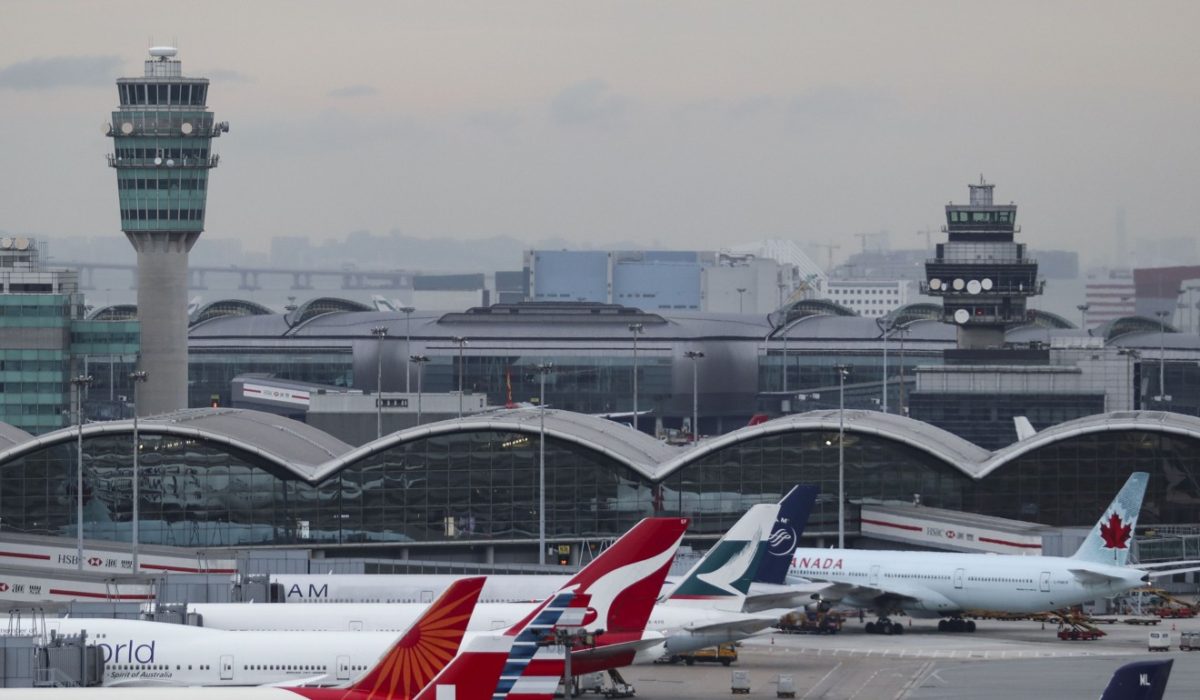The protest crisis has crippled Hong-Kong since June. The economic burden is now born by the tourism and the transportation sector. In August, the city witnessed a double-digit drop in passengers and a decline in tourism of almost 40% compared to the same month last year. The International Air Transport Association (IATA) calls this downfall “a steep decline that is almost unprecedented for major markets”, and the trend is to worsen. Yet, this very sector provides 330,000 jobs and accounts for 10.2 per cent of the city’s GDP.
Airlines are struggling to uphold rentability and are calling the government for help. What is at stake is viability for airlines and Hong Kong airport status as a regional and global aviation hub.
The Board of Airline Representatives (BAR) sent the authorities a letter asking for the city to suspend a number of costly airport charges. Amongst those are landing, parking and air traffic control fees but also rental fees for offices and lounges. The IATA, a lobby which represents heaps of airlines worldwide and about 82 percent of global air traffic, says financial relief would be much welcomed.
The Hong-Kong local government has already helped the aviation industry twice before. First in 2000 : landing and parking fees were cut by 15 percent after the 1997 Asian financial crisis. Five years later in 2009, the same fees were discounted by 10 percent in the wake of the 2008 financial crisis. This measure was part of a wider HK$450 million relief package to assist airlines and other airport operators amid the economic downturn. Airlines were then undergoing increasing jet fuel prices and collapsing travel demand. This time, the aftermath is more important and these past reliefs plans do not come close to the now requested scale.
Is Cathay crashing?

Hong-Kong based airlines are specifically weakened by the city turmoil. Cathay Pacific accounts for half of the traffic at Hong Kong airport. The flag carrier seeks relief through the fees waiver. These costs accounted for 16% of Cathay’s operating costs in 2018. This share is expected to grow dramatically, since aircrafts are grounded and flights are cancelled as they become unprofitable. Cathay has lately reduced its financial outlook, putting the airline on the verge of making a loss for the third time in four years.
Unrest in the city has even specifically targeted the airport when, in August, protestors occupied the latter and its workers went on a strike for two days.

Hong-Kong airport was the world’s eighth biggest airport for passenger traffic in 2017. It handled 74.6 million passengers in 2018, making it the third busiest air hub in Asia, after Beijing and Tokyo Haneda. It’s the world freight leader over Memphis and Shanghai as it is strategically positioned in front of the pearl river delta and its free port. Hence, it is of vital interest for the Bauhinia flag city to maintain a viable airport and airlines.
Landing charges in Hong Kong are the second most expensive compared to its Asian rivals. Moreover, it has soared over the last years as the airport seeks funding for a third runway. Regarding landing, only Tokyo Haneda airport is more expensive, even Singapore’s Changi airport is more affordable. Among all airport revenues, aviation made up a quarter of the airport turnover in the last financial year, much higher than other players in the industry.
Hong Kong airport is also facing direct competition by neighboring Shenzhen airport, planning on a third runway too. Its cost structure is much more competitive. This should alarm the local government and induce it for a true help package in order to maintain the edge.
Over the rainbow
The city of Hong Kong is at a turning point : Carrie Lam, head of Hong Kong local government acknowledges it. She announced 200 initiatives and relief measures in a video address, that would “help city return to normal”. Despite the BAR request, none of these initiative concerned the tourism nor the transportation sector. Waiving the fees would help airlines steer the boat amidst the storm. This time, the airport does not seem eager to reduce its own income in order to help airlines, and the city is doing nothing about it. Carrie Lam ended her address saying she hoped “Hong Kong will soon be able to emerge from the storm and embrace the rainbow”… The tourism sector might get through the storm, but airlines are going through a hard cruise and might not see the rainbow.












































The topic is quite interesting to know and I guess it is unfair for a country for having to bear so much cost compared to other countries. This goes for the airline sector there as well. However, Hong Kong has a lot of “special” rules I would say, so on the other hand it is not that surprising to me. I think the airline industry is unlucky for having to bear the burden of fees right now. But I think Hong Kong will keep on targeting the “lower” sectors rather than richer people, since all the power is there.
Thank you for this interesting article Timothe! With the ongoing protests, it’s unique political situation and it’s financial location in Asia, Hong Kong is such an interesting topic to read about and you captured a less known problem by writing about the aviation and tourist industry! As you showed, the protests have already a massive impact on the city and I think this impact will be felt long term too.
Although I really liked reading your article, I kind of hoped to read more about other possible solutions to increase tourism again besides the decrease of certain fees. For example, one thing the government has done is that from November on they will give out bonusses to travel agencies for booking overnight visitors. Because many visitors will arrive by plane, the government hopes that this will also help the airlines! Although I am not sure that this will help the airlines that much, I am curious what your opinion is on this plan!
Thank you for your answer Florian. What you describe is interesting. Indeed, this policy regarding travel agencies will drive prices down. Yet, I think what is at stake for tourism in Hong Kong is not about prices but rather about security. As a result of the reduced demand, hotels have already lowered their prices. Another set of policies is needed to draw tourists back to the city again.
I was in Hong Kong two weeks ago and you could tell that protests are hurting the city’s tourism industry: empty hotels and free cabs are everywhere from Kowloon to Hong Kong island. However, people I met there ensured me that the media was largely amplifying the actual protests. I think that is the main thing pushing the tourists away from the city.
Also, I agree with you on the fact that hotel occupancy and inbound tourism is positively related to airline activity. A major difference yet remains as of comparing the hotel and the airlines business. Hotels run on a much lower maintenance budget than airlines, they run on two different scales. On the one hand, hotels can lower their prices and allow themselves to make a narrower margin. On the other hand, airlines are cutting the number of operated flights in and out of the city, but they would rather not lower the prices to a certain point where they would lose money. Parking fees are much more costly than an empty room, fixed prices are higher for airlines (that is called yield management).
I think the lack of solution offered by the local – and the central government to the carriers’ worsening financial situation (despite concerns expressed by Hong Kong’s Transport and Housing bureau) means a lot. Hong Kong is not as important to the Chinese economy as it used to be.